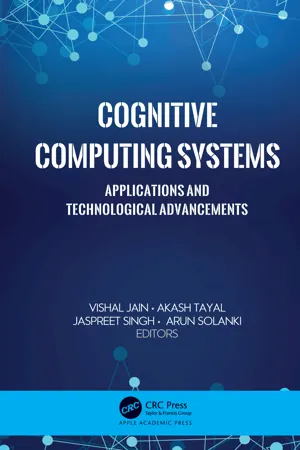
Cognitive Computing Systems
Applications and Technological Advancements
- 408 pages
- English
- ePUB (mobile friendly)
- Available on iOS & Android
Cognitive Computing Systems
Applications and Technological Advancements
About this book
This new volume, Cognitive Computing Systems: Applications and Technological Advancements, explores the emerging area of artificial intelligence that encompasses machine self-learning, human-computer interaction, natural language processing, data mining and more. It introduces cognitive computing systems, highlights their key applications, discusses the technologies used in cognitive systems, and explains underlying models and architectures.
Focusing on scientific work for real-world applications, each chapter presents the use of cognitive computing and machine learning in specific application areas. These include the use of speech recognition technology, application of neural networks in construction management, elevating competency in education, comprehensive health monitoring systems, predicting type 2 diabetes, applications for smart agricultural technology, human resource management, and more.
With chapters from knowledgeable researchers in the area of artificial intelligence, cognitive computing, and allied areas, this book will be an asset for researchers, faculty, advances students, and industry professionals in many fields.
Tools to learn more effectively

Saving Books

Keyword Search

Annotating Text

Listen to it instead
Information
PART I Using Assistive Learning to Solve Computationally Intense Problems
CHAPTER 1 High-Frequency Stochastic Data Analysis Using a Machine Learning Framework: A Comparative Study
1University School of Information, Communication and Technology, Guru Gobind Singh Indraprastha University, New Delhi, Delhi 110078, India
2Skill Faculty of Engineering and Technology, Shri Vishwakarma Skill University, Gurugram, Haryana 122003, India
*Corresponding author. E-mail: [email protected]
1.1 INTRODUCTION
Table of contents
- Cover
- Half Title
- Title Page
- Copyright Page
- Table of Contents
- Contributors
- Abbreviations
- Preface
- PART I: Using Assistive Learning to Solve Computationally Intense Problems
- PART II: Designing IoT-Based Smart Solutions for Monitoring and Surveillance
- PART III: Statistical and Mathematical Model-Based Solutions
- PART IV: Applying Neural Networks and Deep Learning Models for Cognitive Problems
- PART V: Speech and NLP Applications in Cognition
- Index
Frequently asked questions
- Essential is ideal for learners and professionals who enjoy exploring a wide range of subjects. Access the Essential Library with 800,000+ trusted titles and best-sellers across business, personal growth, and the humanities. Includes unlimited reading time and Standard Read Aloud voice.
- Complete: Perfect for advanced learners and researchers needing full, unrestricted access. Unlock 1.4M+ books across hundreds of subjects, including academic and specialized titles. The Complete Plan also includes advanced features like Premium Read Aloud and Research Assistant.
Please note we cannot support devices running on iOS 13 and Android 7 or earlier. Learn more about using the app